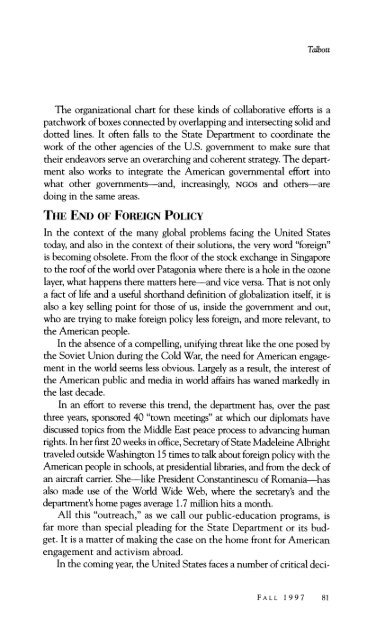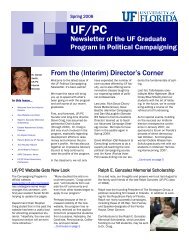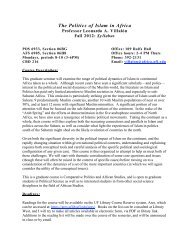Globalization and Diplomacy: A Practitioner's Perspective
Globalization and Diplomacy: A Practitioner's Perspective
Globalization and Diplomacy: A Practitioner's Perspective
Create successful ePaper yourself
Turn your PDF publications into a flip-book with our unique Google optimized e-Paper software.
Talbott<br />
The organizational chart for these kinds of collaborative efforts is a<br />
patchwork of boxes connected by overlapping <strong>and</strong> intersecting solid <strong>and</strong><br />
dotted lines. It often falls to the State Department to coordinate the<br />
work of the other agencies of the U.S. government to make sure that<br />
their endeavors serve an overarching <strong>and</strong> coherent strategy. The department<br />
also works to integrate the American governmental effort into<br />
what other governments-<strong>and</strong>, increasingly, NGOs <strong>and</strong> others-are<br />
doing in the same areas.<br />
THE END OF FOREIGN POLICY<br />
In the context of the many global problems facing the United States<br />
today, <strong>and</strong> also in the context of their solutions, the very word "foreign"<br />
is becoming obsolete. From the floor of the stock exchange in Singapore<br />
to the roof of the world over Patagonia where there is a hole in the ozone<br />
layer, what happens there matters here-<strong>and</strong> vice versa. That is not only<br />
a fact of life <strong>and</strong> a useful shorth<strong>and</strong> definition of globalization itself, it is<br />
also a key selling point for those of us, inside the government <strong>and</strong> out,<br />
who are trying to make foreign policy less foreign, <strong>and</strong> more relevant, to<br />
the American people.<br />
In the absence of a compelling, unifying threat like the one posed by<br />
the Soviet Union during the Cold War, the need for American engagement<br />
in the world seems less obvious. Largely as a result, the interest of<br />
the American public <strong>and</strong> media in world affairs has waned markedly in<br />
the last decade.<br />
In an effort to reverse this trend, the department has, over the past<br />
three years, sponsored 40 "town meetings" at which our diplomats have<br />
discussed topics from the Middle East peace process to advancing human<br />
rights. In her first 20 weeks in office, Secretary of State Madeleine Albright<br />
traveled outside Washington 15 times to talk about foreign policy with the<br />
American people in schools, at presidential libraries, <strong>and</strong> from the deck of<br />
an aircraft carrier. She-like President Constantinescu of Romania-has<br />
also made use of the World Wide Web, where the secretary's <strong>and</strong> the<br />
department's home pages average 1.7 million hits a month.<br />
All this "outreach," as we call our public-education programs, is<br />
far more than special pleading for the State Department or its budget.<br />
It is a matter of making the case on the home front for American<br />
engagement <strong>and</strong> activism abroad.<br />
In the coming year, the United States faces a number of critical deci-<br />
FALL 1997 81








